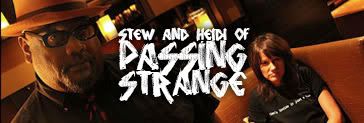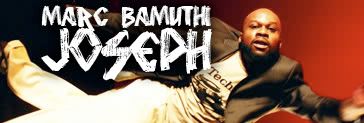SOUL STORIES
A BOY AND HIS SOUL PREMIERES AT LINE BREAKS
WISCONSIN HISTORICAL SOCIETY | 7PM | FREE
The ability of music to bring people together is one of the most well-worn themes in our global culture. But like the well-loved record collection at the center of Colman Domingo’s A Boy and His Soul, sometimes things that seem worn out just need someone to give them a fresh new voice. And that’s just what Domingo offers both the records and the universal themes in his one-man show, which is making its Midwest premiere in Madison fresh off of its successful Off-Broadway run and a GLAAD Media Award for Best New York Theater.
The show chronicles Domingo’s life growing up in West Philly and brims with intricately drawn characters and the sweet sounds of 70s and 80s soul. When Domingo declares, “The glory is in the grooves,” the audience knows that those records are as much a part of his family as his parents and siblings. When this loving but, like all families, sometimes splintered clan deals with more than its fair share of adversity, they fall back on the music. It is there when their connection to the soul feels severed.
“I hope that you will see your own family and your own truths through my performance of A Boy and His Soul,” Domingo says. “It is a love letter to an inner city family, the passing of a generation, and the music that was the soundtrack for our lives. I hope that you gain some tools for your toolbox on how to persevere in this world.” It’s clear that for Domingo, one of the most important instruments in that box is the ability to use music to make a deeper connection to oneself and others.
In this way, the music that forms the soundtrack to Soul does much more than evoke the time and place of the story. The records play multiple roles just like Domingo. At points, the record collection is a character in itself, one with omniscience, empathy and the ability to say the right thing just when a vulnerable character needs it most. At other moments in the show, the likes of Smokey Robinson, Aretha Franklin and Earth, Wind and Fire are secondary narrators, their lyrics filling the gaps where Domingo’s account leaves off.
Other performers might be overshadowed sharing the air with that kind of company, but Domingo commands such a presence that if James Brown were actually standing onstage, our eyes would probably still go to Domingo. Known on Broadway for portraying three wildly different – and equally unique – characters in the Tony-winning Passing Strange (for which Domingo and the rest of the cast won an Obie Award for Best Ensemble) and on television for playing everyone from Maya Angelou to Morgan Freeman on LOGO’s Big Gay Sketch Show, Domingo’s range is unparalleled.
This talent serves him well as he takes on the roles of each of his family members in Soul. One minute he is channeling his sister Averie and the full-on attitude that drips from her every syllable. The next, Domingo is jumping into the skin of his brother Derrick, all machismo and swagger until we just ache for some warmth (and Derrick just might surprise us). Domingo moves through the show exhibiting an underlying tenderness toward his characters, but also an undeniable ferocity, as if he simply must tell this story.
It’s no surprise that “ferocity” is one of the first words Domingo uses when asked what art means to him. “I think that if you are a true hot blooded artist you simply have to put yourself on the line: your message for creating art, the way you open your heart, and the way you pioneer provocative thought,” he elaborates. When asked for advice for young artists, his response comes directly from his own hard-earned experience. “I have challenged the norm by essentially following my gut. Challenge the norm by believing in yourself, your vision and your contribution. Believe that there is room for your voice. Keep knocking on doors until someone hears you. Tenacity is the only way to challenge the norm, or what people have been conditioned to believe is the norm.”
Domingo’s defiance of the norm has been evident in the production since its early days. “The very first readings of A Boy and His Soul were at the legendary 55 Bar in the West Village in New York City,” Domingo notes. In his explanation of his choice, we see yet again the idea of atmosphere, of sound and soul, echoed in his words. “I wanted the readings to happen in the bar because I love the sounds of clinking glasses and laughter. I wanted to take people to my home in the 1970s. When I was a kid my first performances were at my parents’ parties where they asked me to do the robot while they smoked cigarettes and drank corn liquor, with smells of fried chicken, collard greens, Jean Nate and Old Spice filling the air.”
Since Madison doesn’t have its own 55 Bar, how can we prepare for Domingo’s show? “I would love for my audience to have had a few drinks, smokes, laughs, chicken or ribs and to wear something that makes them feel sexy and luxurious like they stepped out of a velveteen 1973 Black Sheba poster.”
By Lauren Rutlin Young
By Lauren Rutlin Young




